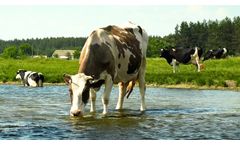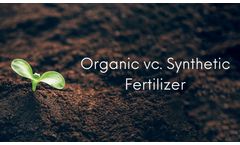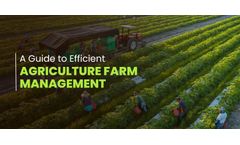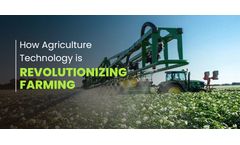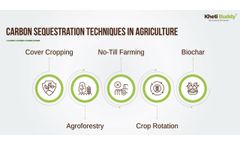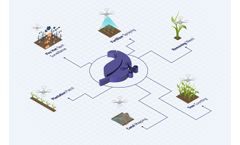Refine by
Healthy Soil Articles & Analysis
131 articles found
Water is the lifeline of agriculture. Its quality plays a pivotal role in crop health, yield, and overall farm productivity. However, one of the most persistent threats to agricultural water sources is algal blooms. These can severely degrade water quality. Hence, achieving algae-free waterbodies is a necessity. Harmful algal blooms (HABs) occur when algae colonies grow uncontrollably in fresh ...
Feeding your plants is a fundamental aspect of nurturing a thriving garden, whether you’re aiming for a bountiful harvest or flourishing blooms. However, the choice of fertilizer significantly impacts the health of your plants and the environment. There are two primary types of fertilizers – organic and synthetic. In this article, we’ll delve into the pros and cons of each, ...
Sustainable agriculture is increasingly recognized as a critical component in addressing the global challenges of climate change, food security, and environmental degradation. One innovative solution gaining traction in this field is the biochar machine, which plays a pivotal role in producing biochar — a stable form of carbon made from organic materials. Biochar’s properties make it ...
Agrochemicals are chemical formulations typically used to control pests, pathogens and provide nutrients to the soil. To meet the growing demand for food, agrochemicals are used in agriculture in large quantities to bridge the gap between food production and consumption. However, the unbalanced application of agrochemicals has led to environmental degradation and poses many challenges to ...
The Agriculture industry serves as the backbone of global food production, contributing to livelihoods and economic growth. Plastics play a vital role in this pivotal industry. Their contributions to water conservation, crop protection, soil health and automation have revolutionized traditional farming practices, increasing efficiency, productivity and sustainability. Advantages of Plastics in ...
Biochar is a carbon-rich material produced through the pyrolysis of organic biomass under low oxygen conditions. Common feedstocks include agricultural waste, forestry residues, and even municipal organic waste. Its porous structure and chemical properties make it highly effective for soil improvement and environmental benefits. Agricultural practices in developing countries often face hurdles ...
Biochar, a carbon-rich byproduct derived from the thermal decomposition of organic materials, is gaining attention for its environmental and agronomic benefits. Derived from agricultural waste biomass, biochar not only provides a sustainable way to manage waste but also serves as an effective soil amendment, enhancing soil fertility and sequestering carbon. Understanding how biochar is made and ...
In an era where agriculture is essential for sustaining the global population, it’s crucial to examine the unseen threats that farming practices pose to aquatic ecosystems. While modern farming techniques have significantly boosted food production, they have inadvertently introduced risks that could undermine the very foundations of our aquatic environments. Farming, whether involving ...
As global agricultural practices address environmental and economic challenges, regenerative agriculture has stood out as a promising approach to creating more sustainable and robust farming systems. This farming method focuses on restoring soil health, enhancing biodiversity, and improving water cycles, ultimately leading to more sustainable food production. Innovative tools and technologies are ...
Agriculture has always been a fundamental part of human civilization, providing the food and resources necessary for survival. However, as the global population continues to rise and climate change presents new challenges, the need for efficient agriculture farm management has become increasingly critical. Implementing modern technologies and innovative practices can help optimize productivity, ...
As global awareness of environmental issues continues to rise, the demand for sustainable waste management solutions is more pressing than ever. In recent years, the push for sustainable practices has brought composting to the forefront of waste management solutions. Composting, the process of decomposing food waste into nutrient-rich soil, has traditionally been a slow, labor-intensive ...
The agricultural sector is at a critical stage. With the global population projected to reach nearly 10 billion by 2050, the demand for food is increasing rampantly. At the same time, there is mounting pressure to adopt sustainable farming practices to protect our planet’s limited resources. This delicate balance between increasing food production and minimizing environmental impact ...
SOUL LYF is a pioneering farmer extension firm. It is at the forefront of this revolution, guiding and servicing over 50,000 farmers in Madhya Pradesh and Gujarat. By embracing digital solutions, SOUL LYF is redefining conventional farming methodologies, enhancing productivity, and promoting bio-dynamic farming practices. SOUL LYF is a private entity with a strong commitment to biodynamic ...
While farming activities have traditionally been associated with greenhouse gas emissions, innovative practices can turn agriculture into a significant carbon sink. This transformation hinges on effective carbon sequestration techniques, which capture and store atmospheric carbon dioxide in soils and plants. Implementing these methods is crucial in our fight against climate change. However, the ...
This prevents them from leaching out of the soil and polluting waterways. https://www.bestongroup.com/biochar-use-in-agriculture-and-farming/Water Conservation Champion: Biochar's porous structure increases the soil's water holding capacity. This is a lifesaver in drought-prone areas, allowing crops to thrive with less irrigation.Soil Structure Superhero: Biochar ...
We We are partnering with Southern Piedmont organic and conventional diverse vegetable farmers through an enhanced incentives program. Farmers will be asked to add cover crops to their vegetable rotation. We will monitor greenhouse gas emissions, soil health benefits, economic impacts, and social barriers to the adoption of using cover crops versus not using cover crops on their fields. This ...
The concept of crop rotation dates back thousands of years, with ancient civilizations such as the Mesopotamians and Egyptians employing rudimentary forms of rotation to sustain their agricultural endeavors. The basic principle behind crop rotation is alternating the types of crops grown in a particular field over time to improve soil fertility, control pests, and maximize yields. In traditional ...
In Southeast Asia's lush, verdant landscapes, a silent revolution is unfolding. Amidst the thriving plantations of Indonesia and Malaysia, Terra Drone Agri, a subsidiary of Terra Drone Corporation, is leading the way toward a sustainable future in large-scale agriculture. By harnessing the power of drone technology, Terra Drone Agri is addressing some of the most critical challenges in the ...
The new European Union (EU) Soil Monitoring Law aims to address this by ensuring healthy soils across all member states by 2050. ...
Biochar, a carbon-rich material produced through the pyrolysis of biomass, has garnered increasing attention for its potential as an organic fertilizer. In this article, we will delve into the myriad benefits and applications of biochar in agricultural practices, highlighting its role in soil health, nutrient retention, and environmental sustainability. Introduction to Biochar Biochar is a stable ...

